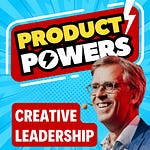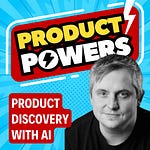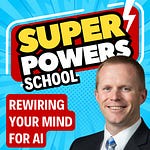It’s been an incredible few weeks. I feel like I’ve been at it non-stop so wanted to take a moment to reflect on a few things I’ve been working on. It all started with a trip to New York for work where I ran a workshop on Human Connection and Creative Thinking for some of the biggest brands on the planet. It seemed to go down a storm, especially with the emergence of AI dominating the headlines - so it was a refreshing change to be able to focus on our human skills.
After landing back in the UK, I was off again 24 hours later to present a keynote (with my good friend Grant Wright - my co-founder of the Visual Jam community) at the BA & Beyond conference in Belgium. The talk was titled Collaboration Mania and it turned into battle of opinions.
And just when I thought my jet-setting had come to a close, I was at QA Ltd’s annual sales conference in Manchester. Was so good to catch-up with so many of my work colleagues and celebrate the past year.
I was then back in the States in Pheonix Arizona for the Building Business Capability conference. Grant and I delivered a half day workshop titled The Sketchy Business Analyst - I’ll let you guess the core theme of the session. But once again, it was received positively and we walked away making a ton of new friends and connections. And I got to ride in my first ever driverless car (more about that in a future newsletter).
And the other week I presented a lightening talk at the Agile Assembly community event. The session was themed around high-performing teams and I got to speak about the power of Communities of Practice.
Other exciting mini projects that I have been working on include a new assessment for an amazing Agile maturity assessment platform, Comparative Agility. It is the world’s largest Agile maturity index with over 3.5m data points and over 14,000 organisations using it. I created the Community of Practice Healthcheck, designed to help groups measure the effectiveness of their communities. You can check it out here.
I’ve also been writing a book which is themed around Product Discovery. It’s been a life long ambition of mine to write, so I’m thoroughly enjoying the experience of actually going through with it. I’ll share more on the progress in the coming weeks.
And finally, I’ve been busy planning our very own conference focused on Visual Thinking, titled International Sketchnote Camp. It will take place between 4th - 6th July in Birmingham. We have international speakers flying in and over 100 attendees flying in from around the world.
That brings us up to date and I am excited to share today’s episode with you. In this episode, agile coach and creative facilitator Laura Re Turner shares how her neurodivergent traits have shaped her facilitation style—and what every product person should do to make workshops more inclusive, energising, and effective.
🧠 The Big Idea
We often obsess over new frameworks, but forget the most powerful tool we have in discovery: the human brain. And not all brains work the same way. Laura argues that if we’re serious about building inclusive products, we need to start by building inclusive collaboration experiences—ones that allow for reflection, creativity, autonomy, and rest. Neurodivergence isn’t a limitation. It’s a lens that can make facilitation radically better for everyone.
1. Design for All Minds, Not Just Loud Voices
Neurodivergent team members often thrive with self-directed learning and visual tasks. Laura recommends:
Using reflection time before group discussion
Providing options for visual or written contributions
Designing activities that balance autonomy with structure
💡 "People who are neurodivergent love to take responsibility for their own learning," says Laura.
2. Reclaim “Old School” Tools Like PESTLE and SWOT
You don’t need a new canvas to do deep thinking. Laura reminds us that tools like PESTLE and McKinsey 7-S have stood the test of time—not because they’re trendy, but because they work. The key is how you facilitate them.
👉 Don’t just run SWOT. Help teams make meaning from it. Ask: What patterns do we see? What feels urgent? What’s actionable?
3. Acknowledge the Exhaustion of Online Work
Being on camera all day is a huge ask for many neurodivergent people, especially those who mask or experience Zoom fatigue. Laura advises:
Turn cameras off for reflection activities
Shorten sessions or break them into chunks
Don't expect constant "camera smiles" — they drain real energy
🎧 “Just being stared at on screen for hours is exhausting,” Laura explains. And she's not alone—research backs this up (see: Bailenson, 2021).
4. Tap Into Creative Flow as a Facilitator
Laura lights up when facilitating because it gives her energy, not drains it. She shares how co-designing games, using physical space intentionally, and letting go of rigid plans can transform workshops from flat to electric.
🖼️ Her art practice has rekindled this creative spark. “Artists are mad in a really great way,” she laughs—and it’s that playful madness that makes facilitation memorable.
5. Facilitation Isn’t Just About Running the Room—it’s About Reading It
Laura shares a moment when her line manager said she looked “radiant” while facilitating. That wasn’t accidental—it was the result of:
Creating an energetic environment (layout, music, tactile materials)
Encouraging play and curiosity from the minute people walked in
Trusting her instincts as a neurodivergent thinker
🧠 When facilitators embrace their own wiring, they help others feel safe to do the same.
🎙️ Favourite Quote from Laura
“Facilitators don’t just use tools—they create space. For safety, spontaneity, and self-expression.”
🧭 How to Apply This in Your Role This Week
Add a self-guided activity to your next workshop
Offer an opt-out from being on camera
Replace one group discussion with a solo sketch-and-share
Bring an old tool back—PESTLE, SWOT, McKinsey 7S—and use it creatively
Observe your own energy: What drains you? What fuels you?
📚 Resources Mentioned
Laura’s book: Becoming Agile
MG Taylor Method (used at PwC, EY, Capgemini)
Vanessa Van Edwards on resting face & nonverbal cues
Bailenson (2021) – Nonverbal Overload: A Theoretical Argument for the Causes of Zoom Fatigue
Guest: Laura Re Turner
Laura Re Turner is an experienced coach and facilitator who blends professional coaching, expert facilitation, and Lean-Agile principles to support organisational change. As the founder of Future Focus Coaching, she helps leaders and teams thrive in complex environments through one-to-one coaching and dynamic group facilitation. Known for creating psychological safety and fostering deep collaboration, Laura draws on a wide range of approaches including systemic coaching, applied positive psychology, and Nancy Kline’s ‘Time to Think’. She is the author of Becoming Agile: Coaching Behavioural Change for Business Results and a regular speaker on the intersection of coaching and Agile.
Website: https://futurefocuscoaching.org/
Book: https://futurefocuscoaching.org/about-us/laura-re-turner/becoming-agile/
Tickets: Click Here













